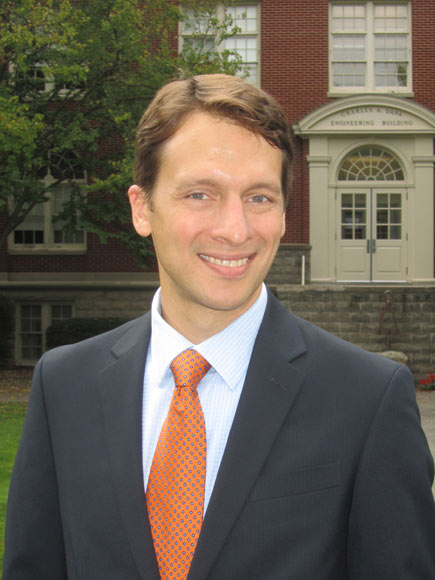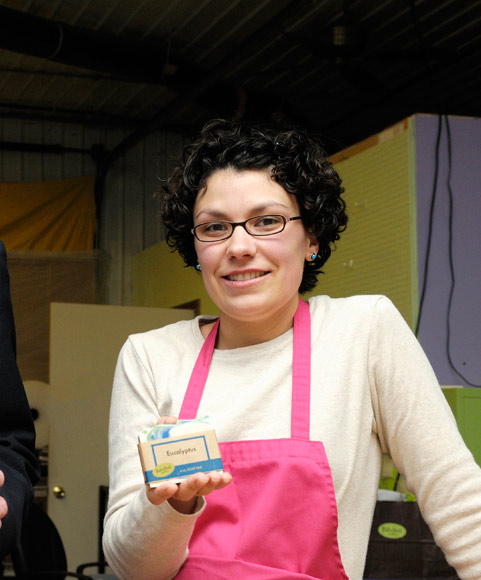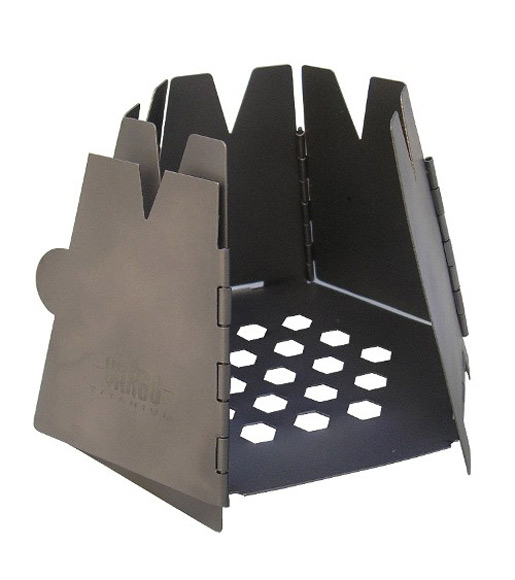With a degree in mechanical engineering, Steven Stumbris started his career with companies manufacturing everything from drilling rigs to marine navigational products to plastics to kitchen cabinetry.
Now, as the new director of the Bucknell Small Business Development Center, Stumbris manufactures opportunity for inventors, aspiring entrepreneurs and small businesses.
Stumbris relates his work to that of Steve Jobs: “Jobs noted that he and Apple and its innovations exist at the intersection of liberal arts and technology. It is at these intersections — between liberal arts and technology, between engineering and entrepreneurship, between academia and business — where brilliant new ideas are formed and innovation occurs.”
Stumbris joined the SBDC in 2007 as manager of the statewide Engineering Development Services program, hosted by Bucknell's College of Engineering and focused on assisting entrepreneurs develop, prototype and commercialize innovative new products. The Bucknell SBDC also maintains an office in downtown Lewisburg, where it provides a wide range of services.
Keystone Edge (KE): With locations both in downtown Lewisburg and on the Bucknell campus, it seems that the Bucknell SBDC is a great example of bridging “town and gown” interests. How does the center help everything from downtown retailers to high-tech ventures?
Steve Sumbris (SS): We see about 30 entrepreneurs create new businesses each year and clients assisted by our Engineering Development Services launch about 10 new products annually.
The Bucknell University Entrepreneurs Incubator, which is co-located with our downtown offices, the SBDC, the Greater Susquehanna Keystone Innovation Zone (GSKIZ) and many other partners are part of a vibrant ecosystem of innovation that entrepreneurs can reach out to and collaborate with.
Our partnerships with our host academic institutions and organizations like the Ben Franklin Technology Partners are also ways in which we provide great value to high-tech companies, but from the downtown retailers to “second stage” companies on the cusp of rapid growth, all clients benefit from the business planning and financial forecasting consulting assistance from SBDC advisors.
KE: What makes Bucknell's SBDC different from others?
SS: One thing that makes Bucknell's center distinctive is that it was the first SBDC in the nation to be hosted by an engineering college. Having offices in the Dana Engineering building on campus provides access to some exciting laboratories and equipment especially relevant to product developers and manufacturers investigating process advances.
Interestingly, the program here at Bucknell had its genesis in the vision of mechanical engineering professor Charles Coder, who sought practical real-world challenges to enrich the class-based projects undertaken by his students.
KE: Can you tell us about some of the Bucknell's SBDC biggest successes — products that have been successfully commercialized, strong entrepreneurs that have emerged?
SS: One is Brian Vargo, owner of Vargo Outdoors in Lewisburg. His company designs and sells high-quality, lightweight titanium camping gear. Their Hexagon Backpacking Wood Stove won a significant design award at a major industry trade show in 2011 and has seen strong worldwide sales since its introduction.
An engineering student, Brent Noll, worked with Brian to create a photo-realistic computer rendering of the product concept before it went to manufacturing, helping to pre-visualize the product appearance and test its form, fit, and function. Vargo recently expanded his retail operations to a new, larger location in Lewisburg serving the Buffalo Valley Rail Trail — a perfect alignment of business and community.
Another recent client is Pompeii Street Soap Company. Pompeii completed an expansion project in 2012, but our work with owner Jessica Grill dates back to 2008 when the SBDC helped her in starting her business with business planning, marketing and financial analysis. Later, as her company grew, the SBDC helped navigate payroll and tax, and recently, when she sought to innovate and expand her product line, the SBDC connected her with a team of chemical engineering students who helped develop a new, all natural soap formulation. Pompeii now is experiencing an exciting period of growth with sales doubling each of the past two years, and they've shipped orders to all 50 states and currently sell to 30 other retail businesses, including salons, natural food stores and more.
KE: How does your own engineering background inform what you do?
SS: Having an engineering background is a wonderful way to connect the worlds of the entrepreneur and the inventor. Both actually share many character traits and seek answers to many of the same questions. They are innovators who look beyond the limits of what has come before and are visionaries who work tirelessly to turn ideas into reality.
My role at the SBDC calls upon my skills and experiences from my career in engineering, manufacturing and product development. The SBDC gives our clients a solid foundation in management principals, and my background also brings to them an awareness and understanding of technology that can transform their business and poise it for growth.
ELISE VIDER is Innovation & Job News Editor for Keystone Edge. Send feedback here.



